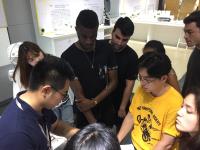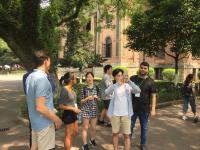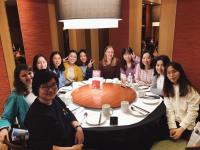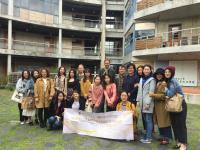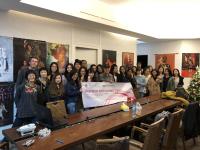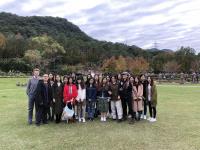|
||
|
||
|
| |||
| 01. 03. 2019 | ISSUE 3 | ||
|
| |||
| Field Trip Reports | |||||||||||||||
|
1. Undergraduate Field Trip to Foshan (in the words of final year BSc student Cheng Peng)
Undergraduate Field Trip to Foshan (in the words of final year BSc student Cheng Peng) The field trip to Guangzhou from May 14 to 19 was a fruitful journey for my major studies. The visit to innovation hubs in Foshan, Sun Yat-sen University, a real estate company, the history museum and colonial relics in Guangzhou enhanced my understanding of the Pearl River Delta. The opportunity to directly interact with a renowned scholar specializing in China's development policy, students of a leading university, managers of the second most valuable real estate company in the world as well as employees of innovation hubs were not only enriching in terms of knowledge, but also inspiring as a learning process. The trip enabled me to reach varied perspectives through exchanging information and opinions on different levels that I could not have reached by myself. Apart from the academic work, the exploration of the city with my classmates was very delightful and the sightseeing further immersed me into the heartbeat of a rapidly growing metropolis. In short, the trip has shaped my perception and recognition of the Pearl River Delta's dynamics and familiarized me with the transformative urban development in Guangzhou.
Many enjoyed the opportunity to learn about Taiwan through an actual visit. In the words of Hilary Zhou Yimeng: "Before this trip, most of my understanding of the issues concerning Taiwan came from books and journal papers, often produced by experts and scholars on cross-straits relations. They are academic in nature, so I felt there may be some distance between these scholarly discussions and the real, genuine thoughts of local Taiwanese people. During this trip, we had discussions with university students in Taiwan on various topics, such as economic development, the issue of identity and local culture. These conversations allowed me to hear the opinion of Taiwan's younger generation." Another student, Sophie Reiß, also appreciated these intellectual exchanges at universities since they allowed her to "ask questions and discuss ideas for [her] research projects". But perhaps more importantly, during the field trip, she extended her learning experiences beyond the confines of classrooms and libraries. Sophie shared that: "I started just asking questions to locals that I met on trains, at hostels or on the street. Many people were very open in sharing their opinions on elections, Taiwanese politics and international relations with me. As my field trip report will be on the different options in cross-strait relations, getting different perspectives helped me put all the history, concepts and theories from the course literature into perspective." Upon their return to Hong Kong, students will write field trip reports on their chosen topics by incorporating both contextual background readings and their findings from the trip. To give an example, Alexandria Preis planned to discuss "the possible implementation of English as Taiwan's second official language." She learnt from the trip that "Mandarin was made Taiwan's official language in 1945, and despite government efforts to keep indigenous languages (such as Hokkien or Taiwanese, and Hakka) alive, there is a decline in indigenous language speakers. The new mayor of Kaohsiung is one of Taiwan's politicians running forward with this bilingual plan, already putting forth ideas of implementing more English into the city such as adding it to signs and billboards. … The benefits of a bilingual Mandarin/English Taiwan are obvious, as people will have many opportunities presented to them with the working knowledge of both languages. However, many of the university students asked questions they thought had been somewhat forgotten, such as the impact of these decisions on Taiwan's culture?" While the conclusion of Alex's academic report remains to be drawn, personally, she thinks the following about this experience: "I will be able to look back on this trip and not only be thankful for the good food, new friends, and deeper knowledge I gained, but also the skill of putting myself into situations and asking how issues impact everyday lives of ordinary people."
MA Field Trip to Taiwan (Chinese Arts and Culture Stream): Report by Liang Yaqing From December 10 to 15, 2018, MA students in the Chinese Arts and Culture stream went on a field trip to Taipei. It was my first time stepping into Taiwan, so the journey was filled with many wonders. We met several famous directors there, such as Tsai Ming-liang, Wu Nien-Jen and Ho Chao-ti. Before the trip, I had watched their movies as well as read some articles and interviews about them, and in person, I felt admiration for their extraordinary personalities. For instance, after a screening of Wu Nien-Jen's A Borrowed Life, the director shared some stories about this film, which moved me deeply. He was quite humorous and always made us laugh, even when talking about something sad. As one of the few literate people in his village when he was a teenager, Wu Nien-Jen always tried to translate complicated news into intelligible stories and retold them to the villagers. This experience influenced his art significantly. In his view, it is important to have a lucid explanation, to tell stories clearly and vividly. In contrast, director Tsai Ming-liang does not attempt to make his films readily comprehensible. One of the salient features of his films is slowness. He argued that audiences do not necessarily need to attain certain information when watching movies, being in a state of tabula rasa is also a way to appreciate films. When we asked him some questions, Tsai would always ask us where we are from before answering. He explained later that he asks this because it makes him optimistic about the future, as even people from places he had never been to are willing to listen, think and explore. Interestingly, both Tsai Ming-liang and Ho Chao-ti mentioned the importance of 'being gentle'. According to Tsai, the feeling of rage is quite conspicuous in Chinese society, so we need to remind ourselves to be gentle, meaning that we should be open-minded and listen to different voices. As for Ho Chao-ti, her family had suffered a lot in political disturbances. Instead of being angery, she chose to be gentle and devoted herself to producing documentaries. In addition to these filmmakers, Li Ya-Mei, the director of the Taipei Film Festival, gave us an informative lecture about film marketing in Taiwan. Cheng Chou, a sound designer, demonstrated the sound design in Midi Zi's cinema. Ray Jiing guided our visit to the Film Collectors Museum and talked about rescuing home videos. When visiting 3H Sound Studio, Tu Duu-Chih, a famous sound designer, displayed how to design sound in contemporary Taiwan cinema in practice. We also visited the screening room of Golden Horse Awards, where we met with Wen Tien-Hsiang, CEO of the Golden Horse Film Festival, who gave us an account of the Golden Horse jury's decision-making. The field trip was both a good chance for us to learn about Taiwan cinema and also a great opportunity to get to know our classmates and teachers better. On ordinary school days, we just have classes together and are too busy to have in-depth communication with each other. In Taiwan, we spent so much happy time together. We visited many places of interest, such as Daxi Old Street and Cihu, and tried unusual-flavored ice-creams and Taiwanese-style massage. We had lunch in Chinese restaurants every day, sitting around and chatting happily. What impressed me a lot was Dr. Timmy Chen's memory about performing military service in Taiwan. I am so glad to have my lovely classmates and teachers.
|
|
||||||||||||||
|
|
|||||||||||||||
|
|
Past Issue
| |
|
|
|
|
|






